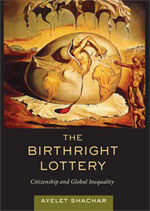Professor Audrey Macklin wrote the following op ed that appeared in the Toronto Star today, titled "Dealing with Dual Citizenship".
Should dual citizens of Canada be entitled to the same treatment as other citizens? Prime Minister Stephen Harper wisely resisted calls to revise existing policy in the midst of the evacuation of Canadians from Lebanon, but announced his government's intention to review Canadian practice now that the evacuation is nearing completion.
Among those who questioned the evacuation, explicit concerns centred on those Canadians in Lebanon who had been living in that country for many years and had more or less relinquished their physical connection to Canada.
Some contended that Canada had no duty to evacuate these non-resident Canadians. Others insisted these Canadians at least ought to pay the government for the cost of evacuation.
The underlying claim is that certain rights of citizenship ought to be tied to ongoing residence in Canada. Living here, the argument goes, expresses one's commitment and membership to Canada. Choosing to live elsewhere signals greater affinity and loyalty to another state, and Canada need not take responsibility for citizens who choose another country over Canada.

